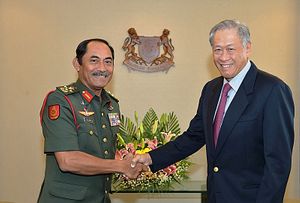Malaysia’s new army chief made his introductory visit to neighboring Singapore this week.
The Chief of Army of the Malaysian Armed Forces, General Zulkiple Kassim, was appointed last December in a series of key reshuffles in the country’s armed forces. Malaysia’s former army chief Raja Mohamed Affandi Raja Mohamed Nor was elevated to chief of armed forces following the retirement of Zulkifeli Mohamed Zin, while Royal Malaysian Air Force chief Roslan Saad was replaced by his deputy Affendi Buang.
This week, Zulkiple was in Singapore from February 8 to February 10 for his first trip to the country.
During his visit, he called on his counterpart Major-General Melvyn Ong after inspecting a guard of honor at Singapore’s defense ministry (MINDEF). He also called on Singapore’s Defense Minister Ng Eng Hen and visited Headquarters 3rd Singapore Division.
In a Facebook post on his meeting with Zulkiple, Ng said both of them had “affirmed the solid defense relations between Singapore and Malaysia and to work together in increasingly uncertain geopolitical environment.”
Both Malaysian and Singaporean leaders have been expounding on the various challenges within this “uncertain geopolitical environment.” For instance, in an address to the annual IISS Fullerton Forum in Singapore last month ahead of the Shangri-La Dialogue later this year, Malaysia’s Defense Minister Hishammuddin Hussein outlined a series of challenges that the Southeast Asian state faced, including the rise of populism and the retreat of globalization; the continued threat of the Islamic State; cyber and fake news; humanitarian disasters; and environmental degradation (See: “What’s Next for Malaysia’s Cyber War?”).
As I have mentioned previously, Malaysia is confronting these threats amid the structural challenge of how to boost its defense budget amid a difficult economic position (See: “What Does Malaysia’s 2016 Defense Budget Mean?”). As an indicator of these constraints, last October, the country announced a defense budget that represented a 12 percent cut from the previous year, the largest made to defense since 1998 when it was reeling from the Asian Financial Crisis (See: “Malaysia’s New China Warships Deal: Promises and Prospects”).
And in an address at a commissioning parade last December, Singapore’s President Tony Tan stressed that as a small island state with an open economy, the country was susceptible to a variety of regional and global conventional and unconventional threats in a “dangerous and uncertain world,” including extremist ideologies, piracy, pandemics, and terrorism which he called a “clear and present” menace. The city-state faced a number of incidents in 2016 that highlighted this, from a failed terror plot to launch a rocket into Singapore from Batam to the seizure of Terrex infantry carrier vehicles.
But Zulkiple’s trip also came amid some uncertainty in the bilateral relationship too, which unsurprisingly did not make the public statements issued. Malaysia’s revival of a decades-old dispute with Singapore earlier this month over the islet of Pedra Branca/Batu Puteh – which was ruled as being under the city-state’s sovereignty by the International Court of Justice in 2008 – has cast a pall over a relationship that had otherwise been quite stable over the past few years.

































